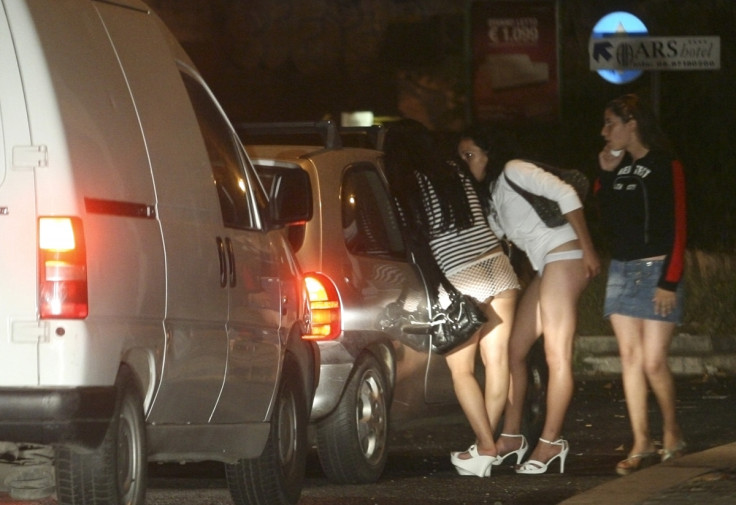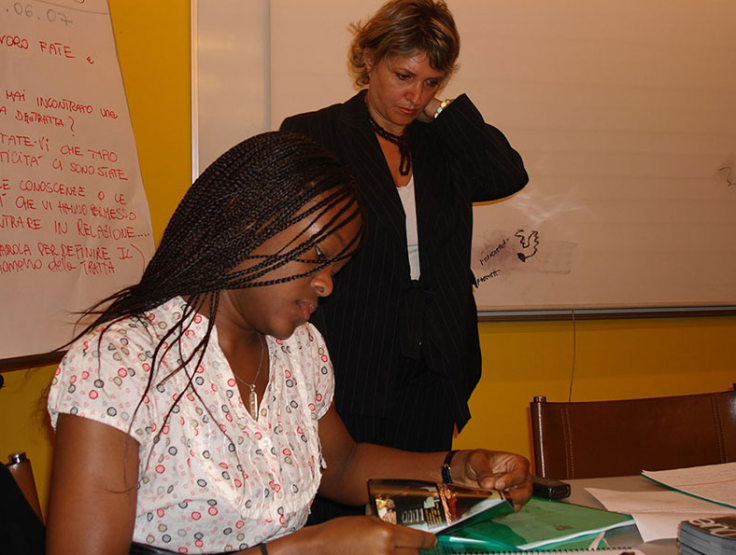International Women's Day 2015: Thousands of female migrants forced into prostitution in Italy every year

Every year thousands of female migrants from all over the world are forced into prostitution as soon as they reach Italy.
Women and girls spend their nights on the streets across the peninsula and, sometimes, also work in apartments that they are not allowed to leave.
Often beaten and generally mistreated, these unfortunate women can have the money they generate taken from them by their procurers, under threat to them, or often to their families back in their countries of origin, if they refuse to work or seek to escape.
Rosanna Paradiso is the president of the Italy-based Tampep, an NGO that promotes the human and civil rights of migrants and migrant sex workers. She believes every year thousands of women and girls are kidnapped and smuggled into Italy and other European countries and forced into sex slavery of one form or another.
"There are kidnappings aimed at providing prostitutes," she told IBTimes UK."These women and girls become slaves. In some cases - such as the ones involving Albanian women - they are kidnapped by their boyfriends who convince them to go to Italy and then force them to become prostitutes."
Paradiso explained that what she calls "the trade of sex workers in Italy" has changed over the years.
"At the beginning of 1990s, women used to come to Italy by plane," she said. "They departed from African states such as Ivory Coast and Nigeria and flew with Alitalia and Air France. They were mainly African prostitutes.
"Today the majority of migrant sex workers in Italy are still Nigerian, but following world events such as the fall of the Berlin wall and the conflicts in Ex-Yugoslavia, women from other countries started coming to Italy, sometimes through Russia, suggesting that the criminal organisation behind prostitution is well structured in more than just one country," she continued.
"Changes have occurred in terms of trade and routes. After 1990's, women started coming first through Morocco and Spain. Today, a lot of women come from Libya asking for asylum status due to the political unrest in their country.They are then forced into prostitution."
Paradiso also explained that migrant sex workers today are forced to work for long hours due to the economic recession and widespread competition.
"The global crisis has led to a decrease of rates for prostitution and thus prostitutes have to work more to earn the same amount of money they used to make a few years back.
"The financial crisis has also led to a fierce competition as nowadays prostitutes in Italy and other areas of Europe come from at least 50 different countries."

The dangers of being on the streets
Street prostitution poses a serious risk for women who can be harassed and even killed, Paradiso explained, urging authorities to increase investigations.
"In 1990's we knew exactly how many women had been killed, but today we don't know the exact figures as the phenomenon is widespread," she said.
"Sometimes we don't even know the identity of the prostitutes because they don't have documents or use fake names. Police forces should investigate until they find out the identity of the victims and the culprits."
In order to help street prostitutes, Tampep provides so-called "street unities" formed by people who approach sex workers and explain to them what they can do to escape their condition of slavery.
"Street prostitution is very dangerous but, unlike indoor prostitution, it allows women to meet someone who can give them a message of hope so they know they are not alone and they can be helped," Paradiso said.

Paradiso explained that migrant sex workers rarely go to the police as they are scared of repercussions and they do not trust authorities.
"The biggest obstacle for us is that we have to defeat diffidence, they don't trust us,"she said.
"At the beginning of 2000 more women used to report to police. But the situation is very critical now because the only women who speak out are in a very dangerous situation and they have been oppressed, beaten and are scared. If they speak out, it's to escape death.
"In some cases, such as with Romanian prostitutes, exploiters arrange with the sex workers to equally divide the earnings to decrease the chances that the women would run away and report them to the police.
"Another reason that prevents some prostitutes from running away is their fear of Voodoo. The madam [a female procurer who shares the earnings of sex workers] often threatens them with Voodoo.
"We can only combat their fears by providing a counter-ideology and defeat misconceptions and myths."
Other main obstacles that prevent prostitution from being defeated are corruption and political unrest, which prompt traffickers from other countries to smuggle women in Europe.
"Prostitution and immigration are huge business and certain people will continue to exploit women if they can benefit from it," Paradiso continued.
"The economic crisis is also a negative factor. In recent years, the Italian government has cut on funds for projects aimed at supporting women. This has caused an increase in prostitution as it is more difficult to protect women without funds."
Journey of suffering
Paradiso explained that even during their journeys to Italy and the rest of Europe, female migrants are abused, beaten and they often die.
"While we were in Nigeria during one of our projects, a woman said that she was going through the desert with traffickers and she was being abused by them," Paradiso said. "She told me: 'If you are strong you can manage it, but if you are weak they leave you behind and nobody will help you. It's a certain death.'
"Once these women reach Italy, they are usually met by a madam who obliges them to repay a debt for having been taken to Italy. Sometimes we speak about €80,000 (£58,000) and €90,000.
"These women are forced to work as prostitutes to pay back the madam, who often threatens them with killing their families."

How does Tampep help?
Tampep works with several associations to prevent slave trade and to sensitise people to the issue of prostitution.
"We also work with authorities to tackle the problem and we run informative campaigns at international but also at local level," Paradiso said.
"Due to government cuts we don't have permanent support and funds and we manage to survive only if we have new projects that are approved and financed," she concluded.
© Copyright IBTimes 2025. All rights reserved.





















